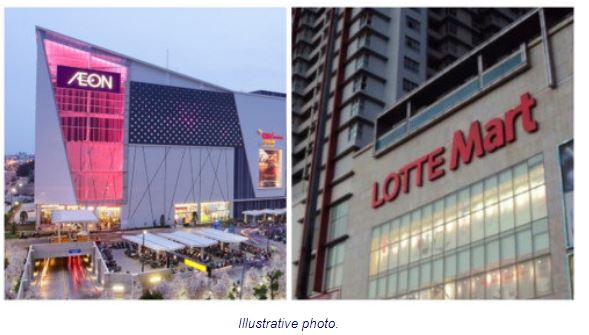South Korea and Japan retailers post contrasting business results in Vietnam
Retail is one of the sector with highest growth rate in the Vietnamese market, reaching an average of 63% in the 2013 – 2016 period. In 2017, Vietnam’s retail sales revenue reached US$129 billion, up 11% year-on-year.
Currently, 50% of the market share in Vietnam’s retail sector belongs to foreign companies, which is forecast to be at a higher rate in the coming time.
Over the past years, Aeon has been expanding its retail network and purchasing shares of local retailers, including Citimart and Fivimart, showing the Japanese retailer’s ambition of claiming a bigger share in Vietnam’s market.
Aeon on track for positive business performance
Aeon established its subsidiary Aeon Vietnam in October 2011 with charter capital of US$192.38 million, which later opened a series of shopping malls in Tan Phu and Binh Tan districts (Ho Chi Minh City), Long Bien (Hanoi) and Binh Duong province.
In 2015, Aeon acquired a 30% stake in Fivimart and 49% in Citimart, with the two owning a combined network of 18 supermarkets in the northern region of Vietnam. Fivimart and Citimart targeted 30 supermarkets across Vietnam by 2020.
Aeon considered Vietnam’s retail market has huge growth potential and plans to establish 20 large-scale shopping malls in the country by 2020. In addition to the existing four shopping malls, Aeon will shortly launch the other two in Hai Phong city and Ha Dong district (Hanoi).
In 2016, the Japanese retailer posted revenue of VND3.88 trillion (US$166.13 million), three times higher than the figure recorded in 2014, leading to a pre-tax profit of VND54 billion (US$2.31 million).
A year later, Aeon’s revenue increased by 32% year-on-year to VND5.13 trillion (US$219.59 million), while pre-tax profit stood at VND234 billion (US$10.01 million).
The Japanese’s recent positive business performance was partly thanks to Vietnam’s consumer preference for Japanese products, for which Aeon is set to sell 30% of Japanese products, 30% of Vietnamese products and the remaining 10% from other countries in all of its malls.
Lotte with accumulated loss of US$192.38 million
In 2007 and 2008, Lotte Mart recorded revenue of VND30 billion (US$1.28 million), which went up to over VND600 billion (US$25.69 million) in 2009.
In the 2013 – 2016 period, Lotte Mart saw its revenue increase sharply, exceeding the VND5 trillion (US$214.09 million) mark in 2016 after 10 years of presence in Vietnam. The South Korean company posted revenue of VND5.26 trillion (US$225.19 million) in 2017.
Despite growing revenue over the last 11 years, Lotte Mart has been reporting losses since its establishment in Vietnam in 2006.
In the 2009 – 2011 period, the company’s loss amounted to millions of USD. The figure then declined in 2012 and 2013, but increased to a high amount since 2014 to present. Specifically, the loss in 2017 was recorded at VND312 billion (US$13.34 billion), accumulating VND800 billion (US$34.26 million) in 11 years.
Jeong Seoung Won, Lotte Mart’s CFO, in a press release sent to local media on May 18 said the reasons for the loss come from a series of shopping malls put into operation by Lotte Mart since 2008. Consequently, Lotte Mart launched the first shopping mall in Ho Chi Minh in 2008, from 2009 to 2013, Lotte Mart opened 5 additional malls. In the next three years, Lotte Mart continued opening seven malls and super markets.
Moreover, each shopping mall when put into operation would need an average from 5 – 8 years to reach a break-even point, Won said.
Since 2008 to present, Lotte Mart has invested VND8.9 trillion (US$389.3 million) in infrastructure development of 13 malls and super markets, as well as other business expenses including advertisement, marketing, promotion, administration.
Additionally, Lotte Mart is facing fierce competition from other competitors, resulting in low performance of those mentioned investments. Lotte Mart’s CFO expected the company to start having profit by 2020, emphasizing its long-term commitment to invest in Vietnam and complying with the country’s laws and regulation.


 Thailand
Thailand




